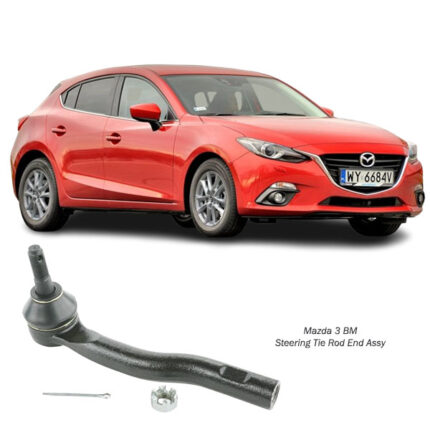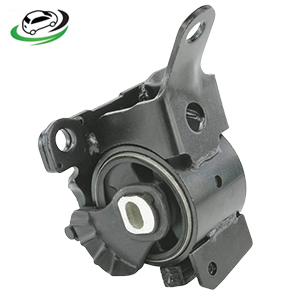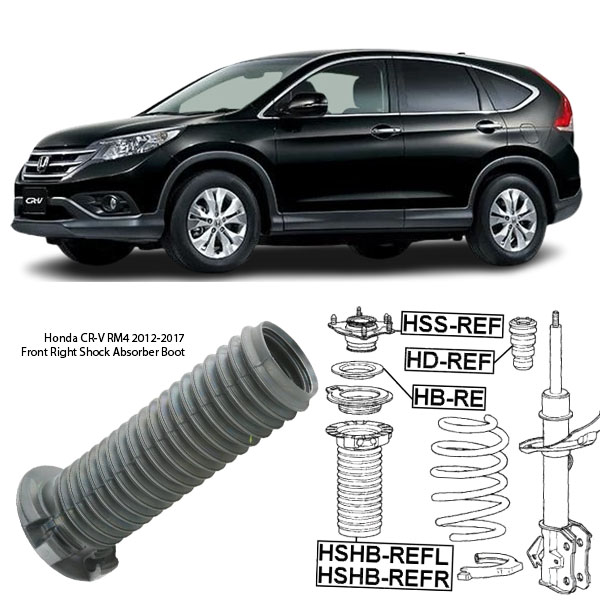-20%
Get Honda CR-V RM4 2012-2017 Front Right Shock Absorber Boot HSHB-REFR in Kenya
When it comes to maintaining your vehicle’s suspension system, one of the often-overlooked but essential components is the shock absorber boot. Specifically, the Front Right Shock Absorber Boot plays a critical role in protecting your shock absorber from dirt, debris, and damage.
In this guide, we’ll dive deep into what a Front Right Shock Absorber Boot is, its functions, signs of wear, replacement process, and why keeping it in good condition is crucial for your car’s performance.
What is a Front Right Shock Absorber Boot? 🛠️
The Front Right Shock Absorber Boot is a rubber or plastic cover that fits over the piston rod of the shock absorber. It acts as a protective barrier to prevent dirt, moisture, and road debris from reaching the sensitive components inside the shock absorber.
🔹 Location: Found on the front right suspension of your vehicle.
🔹 Material: Made of rubber, plastic, or thermoplastic elastomers (TPE).
🔹 Purpose: Prevents premature wear and damage to the shock absorber.
💡 While small and often unnoticed, a damaged or missing shock absorber boot can lead to shock failure, reducing ride quality and vehicle control.
Functions of a Shock Absorber Boot 🏎️
The shock absorber boot isn’t just there for looks—it serves critical functions to keep your suspension system working efficiently.
1️⃣ Protects the Shock Absorber Piston Rod
- Keeps dirt, sand, mud, and road salt from entering the shock absorber.
- Prevents corrosion and rust on metal parts.
2️⃣ Extends the Lifespan of the Shock Absorber
- Reduces wear and tear by blocking contaminants.
- Prevents fluid leaks by keeping the piston seal intact.
3️⃣ Maintains Suspension Efficiency
- Ensures the shock absorber operates smoothly without resistance.
- Prevents premature failure due to dirt buildup or rust.
4️⃣ Reduces Noise & Vibration
- Minimizes squeaking or rattling from loose suspension components.
- Absorbs some of the road vibrations for a smoother ride.
Symptoms of a Worn or Damaged Shock Absorber Boot 🚨
Since the shock absorber boot protects the internals of the shock, a damaged boot can cause major suspension issues over time. Here are some warning signs:
1️⃣ Cracked or Torn Boot 🏁
If the boot is cracked, torn, or missing, dirt and moisture can enter the shock absorber, leading to premature wear.
2️⃣ Grease or Oil Leaks 💧
A damaged boot allows contaminants inside the shock, which can cause seal failure and oil leaks from the shock absorber.
3️⃣ Increased Suspension Noise 🔊
A loose, torn, or missing boot can result in clunking, squeaking, or rattling noises, especially when driving over bumps.
4️⃣ Rougher Ride Quality 🚗
A failing boot can cause the shock absorber to lose efficiency, leading to a bumpy and uncomfortable ride.
5️⃣ Faster Shock Absorber Wear ⚠️
Without protection, the shock’s piston rod is exposed to debris, increasing the risk of corrosion and failure.
🚨 Ignoring a damaged shock boot can lead to complete shock absorber failure, costing you more in repairs! 🚨
How to Replace a Front Right Shock Absorber Boot 🔧
Replacing a shock absorber boot is a moderate-level DIY job that requires removing the shock absorber. If you’re not comfortable with suspension work, it’s best to have a professional mechanic handle it.
Tools & Equipment Needed 🛠️
✔️ Jack & Jack Stands
✔️ Lug Wrench
✔️ Socket Set & Ratchet
✔️ Torque Wrench
✔️ Spring Compressor (if needed)
✔️ New Shock Absorber Boot
✔️ Penetrating Oil (for rusted bolts)
Step-by-Step Replacement Process 🏗️
1️⃣ Secure the Vehicle & Lift the Front Right Side
- Park on a level surface and apply the handbrake.
- Loosen the front right wheel lug nuts before lifting the car.
- Use a jack and jack stands to safely lift and support the vehicle.
2️⃣ Remove the Front Right Wheel & Shock Absorber
- Take off the wheel to access the shock absorber.
- Unbolt the shock absorber mounting bolts from the chassis and suspension.
- Carefully remove the shock absorber from its position.
3️⃣ Remove the Old Shock Absorber Boot
- Inspect the old boot for tears, cracks, or dirt buildup.
- Slide off the damaged boot from the shock absorber’s piston rod.
4️⃣ Install the New Shock Absorber Boot
- Place the new boot over the piston rod.
- Ensure a secure fit to protect against dirt and debris.
5️⃣ Reinstall the Shock Absorber
- Position the shock absorber back into place.
- Tighten all mounting bolts to the manufacturer’s torque specifications.
6️⃣ Reattach the Wheel & Lower the Vehicle
- Secure the wheel and lug nuts.
- Lower the vehicle and torque the lug nuts properly.
7️⃣ Test Drive & Check for Issues 🚗
- Drive over bumps and uneven roads to check for any unusual noises.
- Ensure the suspension feels smooth and stable.
Choosing the Right Shock Absorber Boot ✅
When selecting a replacement boot, consider these factors:
🔹 Vehicle Compatibility – Check your car’s make and model for the correct fit.
🔹 Material Quality – Choose rubber or thermoplastic elastomers (TPE) for durability.
🔹 Brand Reliability – Stick to trusted brands like KYB, Monroe, Bilstein, or OEM parts.
🔹 Weather Resistance – Ensure the boot can withstand extreme temperatures and road conditions.
Why a Good Shock Absorber Boot Matters 🏆
Though small, the shock absorber boot plays a crucial role in protecting your suspension system.
💡 Key Takeaways:
✔️ Prevents dirt and moisture from damaging the shock absorber.
✔️ Extends the lifespan of the shock absorber by reducing wear.
✔️ Maintains smooth ride quality and better handling.
✔️ Reduces noise and vibration for a more comfortable drive.
✔️ Helps avoid costly shock absorber replacements.
🚗 Don’t ignore a damaged shock boot! Regular inspection and timely replacement will save you money and keep your vehicle’s suspension in top shape.
Follow us on Facebook for more parts.



